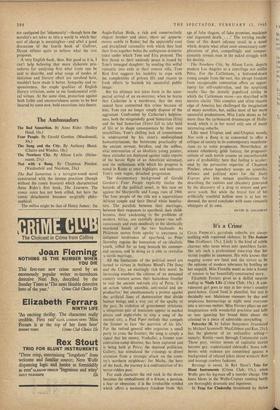The Ambassadors
The Bad Samaritan is a tarragbn-toned novel constructed with the intense precision (though without the comic bravura) which characterised Anne Rider's first book, The Learners. The comic voice has not been stilled, but here the comic detachment becomes surgically philo- sophical.
The milieu might be that of Henry James: the
Anglo-Italian Birds, a rich and conservatively elegant brother and sister, share tin' apparta- memo nobile in Rome; but the apparently cool and disciplined rationality with which they lead their lives together belies the ambiguous domestic truce under which Tom and Etta proceed. The first threat to their unsteady peace is issued by Tom's teenaged daughter; by sending this wilful romantic into exile at their remote villa, Tom Bird first suggests his inability to cope with the complexities of private life and resorts to fresh efforts to burnish his successful public image. , But his ultimate test takes form in the unex- pected arrival of an ex-mistress; when he learns that Catherine is a murderess, that she may indeed have committed this crime because of him, Tom can no longer simply dispose of the aggravant. Confronted by Catherine's helpless- ness, both the misguidedly good Samaritan (Etta) and the bad Samaritan (Tom) fail to take hold of life or to shape consequences by their own sensibilities. Tom's chilling lack of commitment is underscored by his sister's undisciplined humanitarianism, the boisterous practicality of the ancient servant, Serafina, and the selfless, vital intervention of an idealistic young painter; these attitudes are deployed against radio reports of the heroic flight of an American astronaut, and the enthusiasm with which his progress is noted in Rome at once highlights and undercuts Tom's own vague, detached progression. The documentary background of Gerald Gordon's Four People explicitly invites the hazards of the political novel, in this case set against the Sharpeville and Langa riots of 1960. The four people of the title are a superstitious African couple and their liberal white benefac- tors. The parallels between their marriages, between their responses to apartheid, their child- lessness, their awakening to the problems of modern Africa, are carefully drawn—too self- consciously and even needlessly in the identically mutilated hands of the two husbands. As Philemon moves from apathy to awareness to indignant intolerance of apartheid, so Peter Stormley regains the humanism of an idealistic youth, stifled for so long beneath his commer- cial success, and in doing. so is able to revitalise a sterile marriage. All the limitations of the political novel are turned to virtues in Anthony Bland's The Song and the City, an excitingly rich first novel. In increasing numbers the citizens of an unnamed country venture across their hazardous frontier to visit the ancient red-rock city of Petra; it is an action 'utterly anarchic, anti-social and un- productive,' but simultaneously a protest against the artificial lines of demarcation that divide human beings and a way out of the apathy of the past. In violation of government strictures, a ubiquitous pair of musicians appear in market places and night-clubs to sing a song of the ancient city, a Pied Piper melody that compels the listener to face 'the question of his life.' For the retired general who organises a small party to cross the frontier, the song is simply a signal that his enemy, Voshaller, a former con- centration-camp director, has been captured and is being held at Petra; the deposed politician, Gallery, has stimulated the crossings to divert attention from a strategic attack on the coun- try's northern neighbour; for Micha, the hero of the book, the journey is a confrontation of his terror-ridden past.
For each character the red rock in the desert becomes the embodiment of a dream, a passion, a fear or obsession; it is the irreducible symbol which offers a momentary freedom from 'this
age of false slogans, of false promises, machines and organised death... . .' The varying resolu- tions of this desert odyssey result in a novel which, despite what often seem unnecessary com- plications of plot, compellingly and compas- sionately reveals man in the naked struggle with his destiny. The Nowhere City, by Alison Lurie, depicts modern Los Angeles as a centrifuge not unlike Petra. For the Cattlemans, a buttoned-down young couple from the east, this abrupt freedom from recognisable convention offers an oppor- tunity for self-exploration, and the surprising results—like the densely populated circles in which the Cattlemans move—are described with incisive clarity. This complex and often chaotic edge of America has challenged the imagination of many novelists, but, unlike most of her more successful predecessors, Miss Lurie shows us far more than the carbonated dreamscape of Holly- wood, which is in her novel only one of many interesting suburbs. Like most Utopian and anti-Utopian novels, Not with a Bang is as concerned to offer a critique of society in its contemporary manifesta- tions as to voice prophecies. Nevertheless, as science relentlessly gelds fantasy, the prognosti- cations of such novels assume an uncomfortable aura of probability; here that feeling is acceler- ated by the persuasive expertise of Chapman Pincher, whose legendary scoops on scientific, defence and political news for the Daily Express give him unique qualifications for describing the vanities and chicanery generated by the discovery of a drug to restore and pre- serve youth. But while the brutal fate of his artificially youthful hollow men is at last re- deemed, the novel concludes with some romantic whimpers of its own.
DAVID D. GALLOWAY

































 Previous page
Previous page